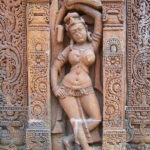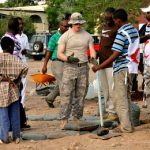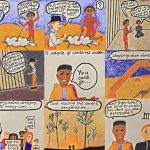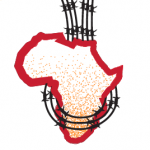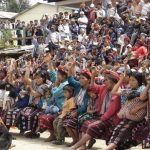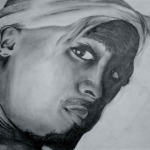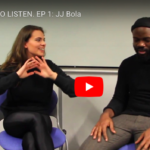by Lisanna Solara Kelz
The author about the Border Regime project: “The intent of this project is to approach the Border Regime in a rather non-scientific way and show how the Border operates, functions, works and is reproduced every day. Therefore, I try to give an overview and insight on the different ways the border appears in and beyond our daily live, within our state and beyond its official borders. I chose Prezi as a design where everyone can look at the topics they are interested in and chose the order in which they want to explore them…”
Category: english
Norms of Beauty in India Fair is Beautiful: A legacy of Colonialism and Globalization
by Khesraw Majidi This paper describes and analyzes the norms of beauty in India by considering the whiteness of people’s skin, Caucasian looks, body shape, and its impact on social status. The paper also analyzes the relationship between skin color,Continue reading… Norms of Beauty in India Fair is Beautiful: A legacy of Colonialism and Globalization
Colonial Legacies – German Volunteer Tourism in Namibia
by Dimitra Dermitzaki
This paper aims at addressing the appropriateness of young “Westerners” when participating in projects of volunteer tourism, inter alia supported by governmental and state funds, while also discussing the complexity of Germany’s refusal of the formal recognition of its committed genocide and reparation payments.
Comic Strip “WHO KNOWS?”
by Tania Plunkett
While studying the subject, “The Invention of Africa,” which was based on V.Y. Mudimbe’s book of the same name, I was struck by the parallels I see in my own country, Australia, regarding the historical and present-day perceptions of Aboriginal and Torres Strait Islanders (ATSI). During my school years through the 1980s and 90s, schools taught Australian colonial history as “Australian history” and painted colonists largely as explorers and heroes. Indigenous histories were mostly excluded or simplified, and ATSI perspectives almost never included.
A magazine of critical perspectives on the G20 summit. Or: The Summit of Colonialism?
by Annika Basten, Dshamilja Roshani, Emmanuel Dahan, Vanessa Lee, Yasmine Bakr
Concerning our aim to break out of academic contexts, it made sense for us to use the form of a magazine as it it allows various media approaches and makes space for conversation with a diverse audience due to its accessible nature. It also provides the possibility to generate, share and discuss information in a digital and physical form. We decided to use the G20 Summit as a focal point as it reflects current political, economic and social processes. We found that public discourse about the G20 often failed to provide firstly general information about the summit itself and secondly explanations for the motivations behind the protests against it, including its whole diversity and controversies. Therefore, we wanted to make this knowledge accessible by summarizing basic information about the G20 before proceeding with our own criticism about the G20 summit. We hope to create alternative narratives – not only by opposing the labelling of G20 protests as useless, destructive and purely violent actions, but also by presenting a different view on the “partnership with Africa” and all its related topics.
Bleeding Latin America the “Nice” Way: Canadian Mining in Latin America
by L. M. K.
In fact, companies are protected by trade agreements which allow them to sue local governments when the latter take action to protect local communities. For instance, “Canada has played an active role in changing regulations governing Colombia’s energy sector in ways that favour Canadian companies,” with neoliberal trade deals which protect investors at the expense of the populations. The local governments are accused of lacking surveillance of the situations where Canadian mining companies operate, without care for the local water sources and populations’ displacements.
Photojournalism and Objectivity – The World Press Photo Contest (2017)
by Catriona Miller and Adèle Brailly
This project is a critique of the World Press Photo Contest from a postcolonial perspective. We state that photojournalism is part of a wider power discourse: colonial tropes are reproduced by depicting a poor and miserable other, in opposition to developed Western people. The very aim of the World Press Photo Foundation is to show what is happening worldwide, in the name of freedom press, freedom of expression, and freedom of speech. But what about the voice of the photographed people? Is it actually necessary to show violent images? Does it raise social awareness? The questions of empathy and dignity of the victims seem to be relevant in a context of continuous information.
On the Power of Narrative – A Play about Racism in Joseph Conrad’s “The Heart of Darkness”
by Lene Glinsky
This is a theater play in which Chinua Achebe confronts Joseph Conrad with all the racist contents in Conrad’s novel on the Congo. The research preceding the writing of this play produced 4 main characters; one is the author Joseph Conrad, who will find himself trying to explain his attitude to colonialism which led to the writing of “Heart of Darkness”. He will be supported by the choir of critics, who try to speak in his favour and defend him against the accuse of racism. On the other side we have Chinua Achebe, Nigerian author and as well the person, who started the debate of racism in Heart of Darkness with his 1975 essay “An image of Africa”. He will be supported by the leading figure of the Reader, which is very positively portrayed as a critical and reflected person who leads the discussion, asks questions and contributes impressions of reading as well as academic knowledge. The dialogues are featuring original quotes from literature essays and interviews.
“I SEE NO CHANGES” – Exploring Mass Incarceration in the United States Through Tupac Shakur’s Lyricism
by Aaron Navid Dahm
This paper examines the issue of mass incarceration, especially its most striking feature, the racial dimension. The issue of mass incarceration is, first and foremost, a social issue and, as such, touches upon the lives of individuals, families and communities. By intertwining the music of Tupac, who was a respected voice within the Black community, with contemporary literature, I seek to break with the traditional antagonistic relationship between researcher and research topic and attempt to make the voices heard of those most affected by the here examined issue of mass incarceration. Two major themes are addressed in this paper: mass incarceration as a system of social control and the War on Drugs as the driving force behind this system. Mass incarceration can be understood as the “what” while the War on Drugs answers the question to the “how”, more specifically the question “how did we get here”? Tupac’s lyricism informs the exploration at every step of the way. Many aspects of both the system of mass incarceration as well as the War on Drugs, are addressed in his lyrics and can be explored through them. But Tupac’s voice in this paper transcends the mere function of illustration. His commentary allows the reader to gain insights into the inner life of the Black community and the effects which the system of mass incarceration has had especially on impoverished ghettos. Since the here explored system of mass incarceration has had a paramount effect on a whole population – the Black community – I think of it as my responsibility as a researcher to make these effects visible through an authentic voice from within this community. As we will see Tupac’s lyrics add an invaluable dimension to the effort of understanding this complex issue.
Genocide in the Congo: It’s Time to Listen – A Video Podcast
by Nina Sophie Meyer
Have you ever asked yourself how Congo is the most resourceful country in the world, yet its people are amongst the poorest? “It’s Time To Listen”, sheds some light on the horrors of the continuing exploitation of the African continent, specifically of the DRC and its people. Not only is this topic largely neglected in the mainstream media, the prevailing discourse is having us believe that the struggles of the DRC and its people are neither directly caused by European continent nor actively affect it. This podcast is an attempt to expose some hidden truths, to explain who is concealing them and why.

